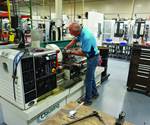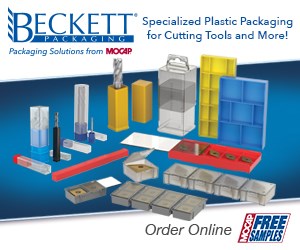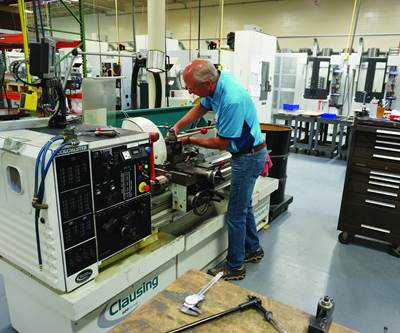Partnerships: The Ultimate Relationship
Whether customer or vendor, partnerships are key to a company’s success.
Have you had the opportunity to work with a customer who you consider a partner? Have they considered you a partner as well? There are numerous advantages to each if you’re fortunate enough to succeed. For the shop involved, you must create and establish a sincere effort to support your customer. You must display honesty, integrity and show real effort in making your customer succeed. For the customer, you must believe in your vendor and show them a high degree of trust, but not blind loyalty.
What are the goals? If your shop has a “one contract and done” mindset, then I’m not talking to you. If your objective is a long-term relationship, then you must first cultivate, then fertilize a relationship as it blossoms.
Customer Relationships
Staub Machine has worked with many customers over the last 40 years of operation. This experience has taught me that all customers are different; there’s no common formula for success. For instance, some customers can never be thought of as a partner no matter how hard you try. There’s no mojo. Some customers always treat machine shop as the enemy, pitting one shop against another and dangling carrots in hope of getting the best price or delivery. They never buy into a long-term relationship and are never able to reach “partner” level. From the other side, I’ve seen numerous shop owners who absolutely do not display the qualities to elevate them to a “partner” level. As a quality vendor-partner you must commit and prioritize that partner and never, ever take advantage of a customer in a jam.
We worked with one customer (I’ll refer to them as Customer A) very closely for more than 30 years. The more trust they placed in us, the more we were inspired to do a good job. Customer A trusted us with manufacturing decisions and appreciated design suggestions. For instance, when coming to us with new projects, they would routinely ask for our machining input. They understood that there are many ways to design a product and wanted to use a design that was easier to manufacture. We were able to show them how to take advantage of new machine features and associated technology. Years ago, we introduced them to live tooling on a lathe. We could drill, tap and mill off centerline without a substantial price increase. Sometimes our input resulted in a better design and a lower cost. There’s a term for that now: design for manufacturability (DFM).
Customer A trusted us with manufacturing concepts and design ideas, such as new projects. They’d come to us and say we have a new initiative and we’d like you to help. They gave us a seat at the design table. We were a part of the research group that brought on other suppliers such as tool and die shops, impact extrusions, powdered metal shops, die casters and more. We accompanied them on road trips and even to Europe to research a motor manufacturer. We were not paid for these trips nor did we expect anything. On the other hand, Customer A did not go out for bid on the components we were expected to make. There were many times in which we did not establish a price until we were finished with the fixtures and the programming, and got into the production. I hope it’s obvious that this amount of trust is only given to a supplier that can be trusted. We were sensitive to Customer A’s best interests. You might also say that we were invested in each other. For example, we committed over $3 million for equipment and facilities for a new project, all without a written agreement or purchase order.
As a result of our partnership with Customer A, we both realized benefits that were not obvious in the beginning. Many of them were described in the book “The Speed of Trust” by Stephen Covey. Our Partnership got us results faster and with less cost. We continue to contribute with design input and quality control perspective to this day, and our partnership remains strong.
Vendor Relationships
It is obvious that we want tight relationships with our customers, but it is easy to forget that close, trusted relationships with our vendors can be just as important. Staub has crucial partnerships with several vendors. We are trying to build a virtual vertically integrated supply chain. In this chain, one weak link can sink a project, so we spend considerable effort cultivating relationships with our vendor partners, not beating them up. This relationship must be mutually beneficial. We can’t forget that our vendors are running businesses too.
A prime example is our machine tool supplier. Local distributors are normally thought of as sales organizations. Our relationship is much different. We have sensitive conversations and share crucial details of projects with our sales rep. The rep cannot help us without knowing what we are trying to accomplish. We explain the end goal and then listen to feedback on equipment and processes. Sometimes the solution is their product, and others involve equipment or automation that we find elsewhere. I can honestly say that after 25 years of working with this firm, I have never felt they were after the commission. I feel they care about Staub’s future, and the trust that we’ve developed has benefitted both companies.
I have always believed in partnerships. Whether it’s a customer or a vendor, partnerships have been a key to our success.
Read Next
Machine Shop for Sale
Reflections on the why, the how and the final outcome of selling my machine shop.
Read MoreInside Machineosaurus: Unique Job Shop with Dinosaur-Named CNC Machines, Four-Day Workweek & High-Precision Machining
Take a tour of Machineosaurus, a Massachusetts machine shop where every CNC machine is named after a dinosaur!
Read More














.jpg;maxWidth=300;quality=90)




